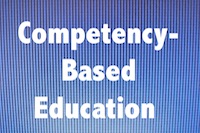Understanding faculty training in competency‐based curriculum development
 Background
Background
Competency‐based (CBE) programs have increased significantly over the past decade in response to a changing higher education environment. This dramatic increase in CBE programs has been supported by faculty tasked with developing curriculum composed of competency statements, assessment strategies, and learning content. Yet, little is known about the types of training and support provided to faculty and faculty‐perceived levels of competence in CBE curriculum development.
Methods
This study used a convenience sample to gather survey data from 70 faculty members who had developed CBE curriculum. Participants provided information on the CBE components developed, types of training received, and hours spent in training. Each faculty member also identified his or her perceived level of competence in content development, assessment development, collaboration skills, technical skills, and communication skills. A correlation analysis was used to compare training histories with perceived levels of competence in the five skill areas identified.
Findings
Results suggest that the type of training a faculty member receives affects his or her perceived levels of confidence in CBE curriculum development skills. A significant relationship between total hours of training and level of competence was indicated with four types of training: one‐on‐one training with an expert, webinars, phone conferences, and self‐study.
Conclusion
The most important conclusion is the result of the final hypothesis: there is a significant positive relationship between motivating students (faculty) to engage and level of competence. Both student (faculty) retention and success are related to higher levels of engagement (Tools for teaching, 2nd ed. San Francisco, CA: John Wiley & Sons, Inc; 2009).







